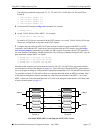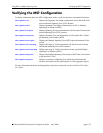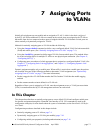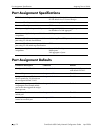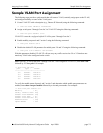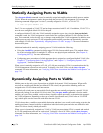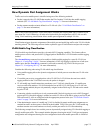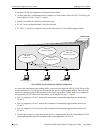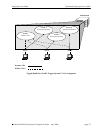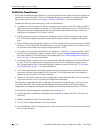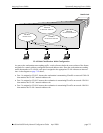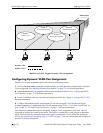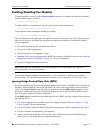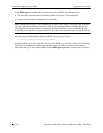
Assigning Ports to VLANs Dynamically Assigning Ports to VLANs
OmniSwitch 6600 Family Network Configuration Guide April 2006 page 7-5
How Dynamic Port Assignment Works
Traffic received on mobile ports is classified using one of the following methods:
• Packet is tagged with a VLAN ID that matches the ID of another VLAN that has mobile tagging
enabled. (See “VLAN Mobile Tag Classification” on page 7-5 for more information.)
• Packet contents matches criteria defined in a VLAN rule. (See “VLAN Rule Classification” on
page 7-8 for more information.)
Note. Using IP and IPX protocol VLAN rules allows a mobile port carrying both types of traffic to join
more than one VLAN. Otherwise, all other rules limit mobile port assignment to one VLAN at a time.
Using VLAN mobile tag classification allows mobile port assignment to multiple VLANs.
Classification triggers dynamic assignment of the mobile port and qualifying traffic to the VLAN with the
matching criteria. The following sections further explain the types of classification and provide examples.
VLAN Mobile Tag Classification
VLAN mobile tag classification provides a dynamic 802.1Q tagging capability. This features allows
mobile ports to receive and process 802.1Q tagged packets destined for a VLAN that has mobile tagging
enabled.
The vlan mobile-tag command is used to enable or disable mobile tagging for a specific VLAN (see
Chapter 4, “Configuring VLANs,” for more information). If 802.1Q tagging is required on a fixed (non-
mobile) port, then the vlan 802.1q command is still used to statically tag VLANs for the port (see
Chapter 11, “Configuring 802.1Q,” for more information).
Consider the following when using VLAN mobile tag classification:
• Using mobile tagging allows the dynamic assignment of mobile ports to more than one VLAN at the
same time.
• If a mobile port receives a tagged packet with a VLAN ID of a VLAN that does not have mobile
tagging enabled or the VLAN does not exist, the packet is dropped.
• VLAN mobile tag classification takes precedence over VLAN rule classification. If a mobile port
receives traffic that matches a VLAN rule and also has an 802.1Q VLAN ID tag for a VLAN with
mobile tagging enabled, the port is dynamically assigned to the mobile tag VLAN and not the match-
ing rule VLAN.
• Connecting a hub to a mobile port is only recommended if the hub is going to receive 802.1Q tagged
packets and VLAN mobile tagging is enabled on switch VLANs or if the hub is going to receive IP and
IPX traffic and VLANs are configured with the appropriate protocol rules (see “VLAN Rule Classifi-
cation” on page 7-8 for more information).
• If the administrative status of a mobile tag VLAN is disabled, dynamic mobile port assignments are
retained but traffic on these ports is filtered for the disabled VLAN. However, the VLAN mobile tag
attribute remains active and continues to classify mobile port traffic for VLAN membership.
The following example shows how mobile ports are dynamically assigned using VLAN mobile tagging to
classify mobile port traffic. This example includes diagrams showing the initial VLAN port assignment
configuration and a diagram showing how the configuration looks after mobile port traffic is classified.



